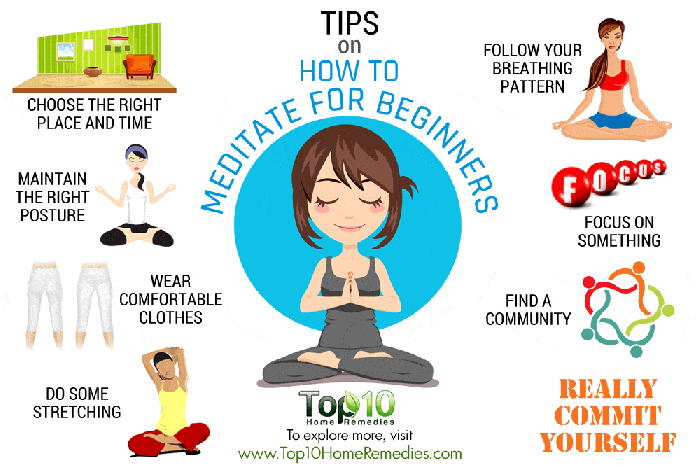How to Meditate for Strengthening Your Mental Health sets the stage for this enthralling narrative, offering readers a glimpse into a story that is rich in detail with neil patel author style and brimming with originality from the outset.
Embark on a journey to discover the transformative power of meditation in enhancing mental well-being through various practices and techniques.
Introduction to Meditation

Meditation is a practice that involves focusing the mind and eliminating distractions to achieve a state of mental clarity and emotional calmness. It has been practiced for centuries in various cultures and religions around the world. The benefits of meditation for mental health are numerous, including reduced stress, anxiety, and depression, improved focus and concentration, enhanced self-awareness, and increased feelings of peace and well-being.
Struggling to regain your mental focus? No worries, we got you covered! Dive into this article on How to Meditate for Regaining Your Mental Focus and get back on track!
Types of Meditation Practices
- Mindfulness Meditation: Involves focusing on the present moment without judgment. It helps individuals become more aware of their thoughts and emotions.
- Loving-Kindness Meditation: Focuses on cultivating feelings of love, compassion, and kindness towards oneself and others. It can help improve relationships and reduce negative emotions.
- Transcendental Meditation: Involves repeating a mantra silently to achieve a state of deep relaxation and heightened awareness. It is often practiced for 20 minutes twice a day.
- Yoga Meditation: Combines physical postures, breathing exercises, and meditation to improve overall well-being and reduce stress. It is a holistic approach to mental and physical health.
Getting Started with Meditation

When beginning your meditation practice, it’s important to set yourself up for success by creating a quiet and comfortable space.
Hey there, looking to strengthen your mindfulness practice? Check out this awesome guide on How to Meditate to Strengthen Your Mindfulness Practice for some great tips and techniques!
Finding a Quiet and Comfortable Space
- Choose a space free from distractions, where you can relax and focus without interruptions.
- Consider using cushions or a meditation mat to make your space more comfortable.
- Dim the lights or use candles to create a calming atmosphere.
Posture and Breathing Techniques for Beginners
- Sit comfortably with your back straight and shoulders relaxed to allow for easy breathing.
- Place your hands on your knees or in your lap, palms facing up or down.
- Focus on your breath, taking slow, deep breaths in through your nose and out through your mouth.
- Pay attention to the rise and fall of your chest and belly with each breath.
Importance of Consistency
- Try to meditate at the same time each day to establish a routine.
- Start with short sessions, gradually increasing the duration as you become more comfortable.
- Consistency is key to reaping the benefits of meditation for your mental health.
Techniques for Strengthening Mental Health: How To Meditate For Strengthening Your Mental Health

Mindfulness meditation is a powerful technique that involves being fully present and aware of your thoughts, feelings, and surroundings without judgment. This practice can significantly impact mental well-being by reducing stress, anxiety, and improving focus and emotional regulation.
Mindfulness Meditation
- Focus on your breath or a specific sensation in your body to anchor yourself in the present moment.
- Acknowledge any thoughts or emotions that arise without getting attached to them, simply observing them without judgment.
- Practice self-compassion and kindness towards yourself during the meditation process.
- Regular practice of mindfulness meditation can lead to increased self-awareness, emotional resilience, and overall mental clarity.
Loving-Kindness Meditation
- Loving-kindness meditation involves cultivating feelings of love, compassion, and goodwill towards yourself and others.
- Start by directing positive intentions and phrases towards yourself, then gradually extend them to loved ones, acquaintances, and even difficult individuals.
- This practice can help foster positive emotions, empathy, and a sense of interconnectedness with others, leading to greater emotional well-being and reduced feelings of isolation.
Mantra Meditation
- Mantra meditation involves repeating a word, phrase, or sound silently or aloud to focus the mind and induce a state of deep relaxation.
- Choose a mantra that resonates with you or seek guidance from a meditation teacher to find a suitable mantra for your practice.
- Repeating the mantra helps to quiet the mind, reduce stress, and anxiety by redirecting your attention away from negative thoughts or worries.
- Consistent practice of mantra meditation can create a sense of calm, inner peace, and mental clarity over time.
Integrating Meditation into Daily Life

Integrating meditation into your daily routine can have a profound impact on your mental health and overall well-being. By incorporating short meditation sessions throughout the day, you can experience benefits such as reduced stress, improved focus, and increased emotional resilience.
Incorporating Short Meditation Sessions
One way to integrate meditation into your daily life is to start your day with a short meditation session. This can help set a positive tone for the day ahead. Additionally, you can take short meditation breaks during work or school hours to refresh and refocus your mind. Finally, ending your day with a calming meditation can help you unwind and prepare for a restful night’s sleep.
Benefits of Using Meditation Apps or Guided Meditation, How to Meditate for Strengthening Your Mental Health
Using meditation apps or guided meditation can provide valuable support and guidance for your meditation practice. These resources offer a wide variety of meditation sessions tailored to different needs, such as stress relief, sleep improvement, or emotional healing. They can also help you stay consistent with your practice by sending reminders and tracking your progress.
Tips for Overcoming Common Challenges
- Start small: Begin with just a few minutes of meditation each day and gradually increase the duration as you become more comfortable.
- Find a quiet space: Choose a peaceful environment where you can meditate without distractions.
- Set a schedule: Establish a regular meditation routine by practicing at the same time each day.
- Be patient with yourself: It’s normal to experience wandering thoughts or restlessness during meditation. Instead of judging yourself, acknowledge these distractions and gently bring your focus back to your breath or mantra.
- Seek support: Joining a meditation group or seeking guidance from a meditation teacher can provide you with additional encouragement and motivation.
As we conclude our exploration of meditation for mental health, remember that the path to inner peace is within reach through consistent practice and dedication. Embrace the stillness within and let your mind flourish with clarity and serenity.
Having trouble getting a good night’s sleep? Discover these 7 amazing tips on How to Meditate for Deep Restorative Sleep: 7 Tips to help you drift off peacefully and wake up refreshed!